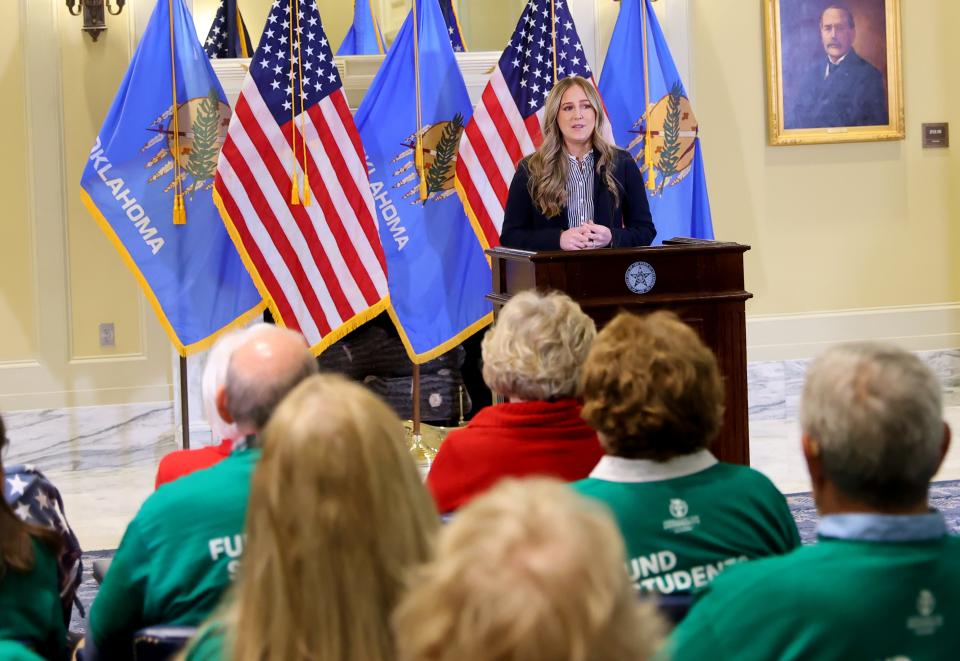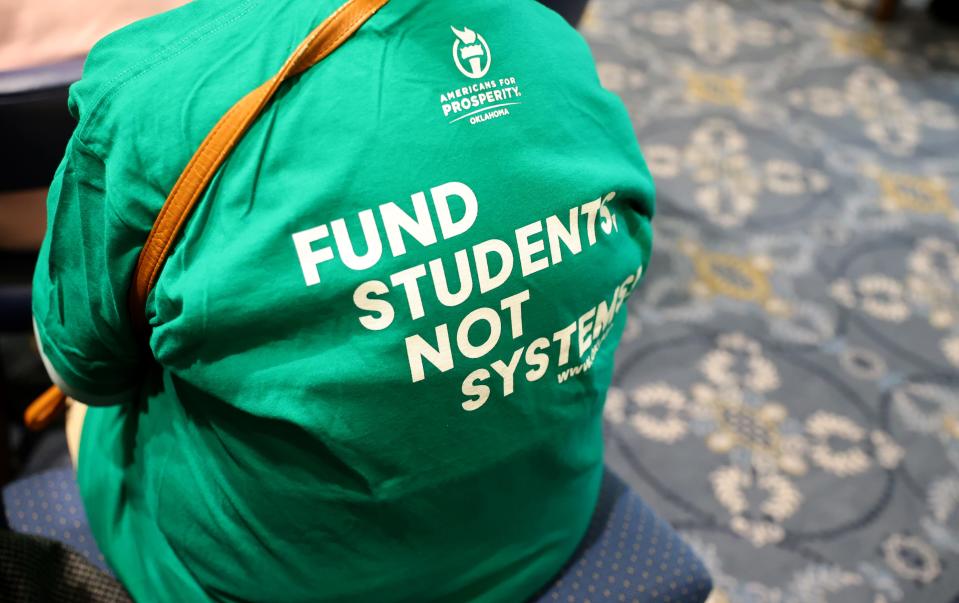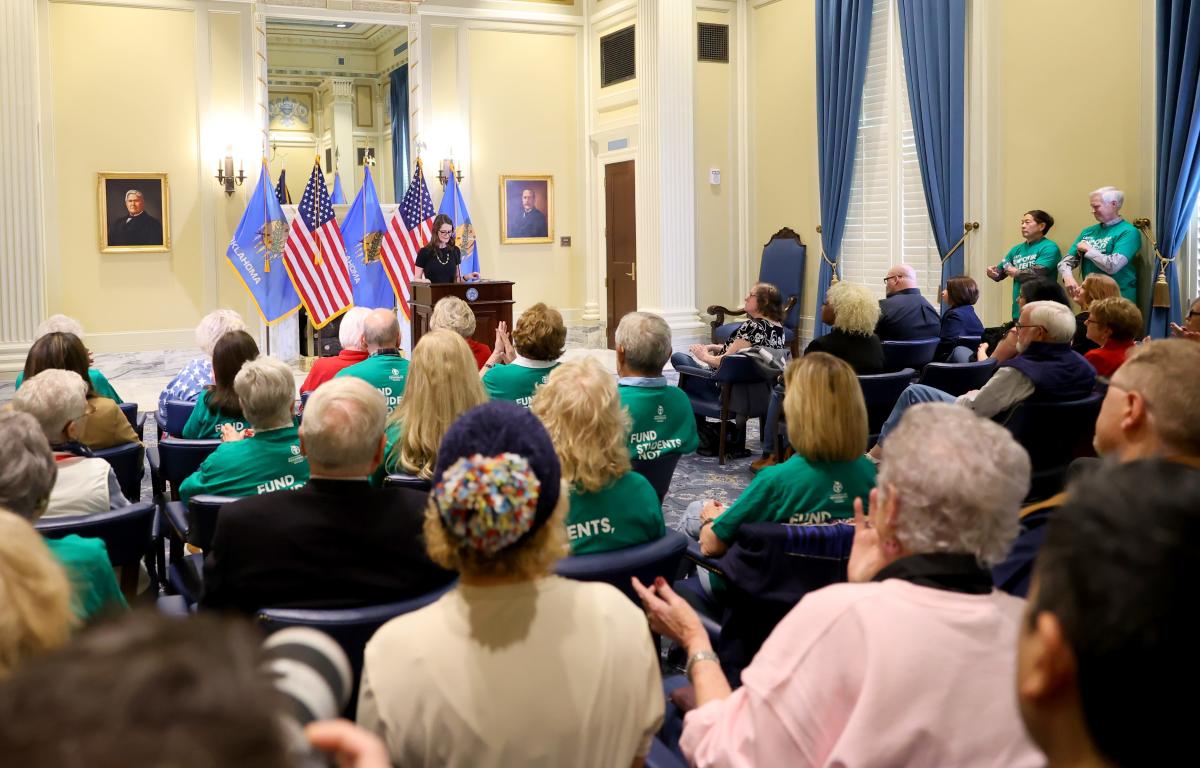The group Americans for Prosperity held a rally at the state Capitol on Wednesday, with representatives from other well-known, politically conservative organizations — including Heritage Action for America, Moms For Liberty and the think tank Oklahoma Council of Public Affairs. All are active in support of parental empowerment in education.
One point of emphasis for the groups during the current legislative session is passage of a bill that would move school board elections from February (primary) and April (general) to June and November, respectively.
Two bills were filed this year toward that end. One, House Bill 3653, by Rep. Chris Banning, R-Bixby, passed the House Election and Ethics Committee but wasn’t heard by the full House of Representatives before a legislative deadline. The other, Senate Bill 244, by Sen. Ally Seifried, R-Claremore, passed the Senate and was initially referred to the House Education Committee before being withdrawn from that committee and moved to the House Rules Committee, where it awaits a vote. Rep. Toni Hasenbeck, R-Elgin, is the House sponsor of Seifried’s bill.
Seifried, Hasenbeck and Banning were among the speakers during the rally, along with Nellie Tayloe Sanders, the state’s education secretary.
“There’s so many elections in Oklahoma throughout the year,” said Janice Danforth, chair of the Moms for Liberty chapter in Tulsa. “People are busy. Moms are working. Dads are working, so if we can shift (school) elections to the general election (when) we know they’re going to vote … why would we not want to use that advantage for parents to go vote and get engaged in common ed?”
Hasenbeck called voting in school elections “a parent’s divine right” and rattled off a list of numbers of voters in various district elections on Tuesday. Deer Creek, a large district in northwest Oklahoma County, had 366 people cast ballots for a board seat, with James Gibbs beating Paul Elder 197-169.
In a race for a seat on the board of Oklahoma City Public Schools — the state’s second-largest district, with about 33,000 students — 350 people cast ballots, with Jessica Cifuentes beating incumbent Cary Pirrong 233-117.
In a bond election in February in the Western Heights Public Schools district in southwest Oklahoma City, only 120 voters turned out. The $2.96 million bond proposal passed with 63.3% of voters in favor, a little more than the required 60%.
“The more people we get to the polls, the better off we are,” Hasenbeck said. “I want everybody to exercise their right to vote. … Every time I think about anything I do at the Capitol, I just feel like our founders wanted a lot of folks to vote.”

Some say separate elections allow education issues to take center stage
Some argue, however, for keeping school elections separate on voting day. Rep. Amanda Swope, D-Tulsa, said holding school elections on a different day from the general election serves a purpose — to allow people who pay close attention to education a chance to have their races be a focus of the electorate, without the clutter of federal, state and county races on the ballot.
“It keeps the election from being something that people who aren’t paying attention to education are participating in — people who aren’t focusing on those issues, or who aren’t familiar with the candidates, or aren’t researching issues,” Swope said. She called the bills “an attempt to get it on a general election ballot so they can include it into straight-party voting.”
Like Hasenbeck, Banning expressed concern about low turnout, noting elections for school board seats at two large Tulsa districts, Union Public Schools and Tulsa Public Schools, drew 146 and 649 voters, respectively. Tulsa is the largest school district in Oklahoma. A board election in Owasso, a large suburban district near Tulsa, drew 810.
“This has to change,” Banning said. “If we can do this while saving the state money, that’s just a plus, but either way, this has to change to where we get ‘We, the People’ deciding that this person meets the community standards. That’s what it’s going to take … That school board member needs to be in touch with community standards. They don’t need to have a doctorate in education. We have those folks in the schools already.”
Banning said school districts reported spending a combined $12.3 billion in local and federal money in 2023, which he noted was more money than the Oklahoma House appropriated the same year.
“We have 2,366 school board members controlling more than the House of Representatives appropriated in 2023,” he said. “These are important elections, and we need to get us out to vote. We need everyone possible that’s a registered, qualified elector to be out to the polls to vote in these elections.”


Swope acknowledged low-turnout numbers for school elections. She said when she’s discussed the reasons why with constituents while knocking doors in her district, she’s learned many people who don’t have children attending school don’t think they need to show up for such elections. Swope disagrees.
“Paying attention to these things is important,” she said. “School boards are where a lot of bond money is spent, so it’s something we should be paying attention to. … We need individual people to be able to pay attention to what’s going on in the school board and supporting your community. What I’ve heard is people without kids don’t feel like they have an obligation, but at the end of the day, our kids are the future of Oklahoma. We should be paying attention.”
This article originally appeared on Oklahoman: Americans for Prosperity push to change Oklahoma school election date
